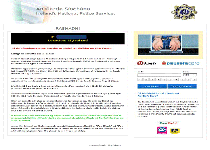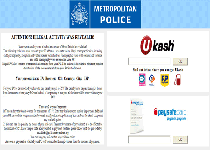‘An Garda Siochana’ Ransomware
 'An Garda Siochana Ireland's National Police Service' ransomware is a variant of the Ukash Virus that's specific to the region of Ireland. While 'An Garda Siochana Ireland's National Police Service' ransomware represents a new country for Ukash Virus -based Trojans to attack, 'An Garda Siochana Ireland's National Police Service' ransomware's scam is identical to those that are used by other members of its family. 'An Garda Siochana Ireland's National Police Service' ransomware infections...
'An Garda Siochana Ireland's National Police Service' ransomware is a variant of the Ukash Virus that's specific to the region of Ireland. While 'An Garda Siochana Ireland's National Police Service' ransomware represents a new country for Ukash Virus -based Trojans to attack, 'An Garda Siochana Ireland's National Police Service' ransomware's scam is identical to those that are used by other members of its family. 'An Garda Siochana Ireland's National Police Service' ransomware infections...

